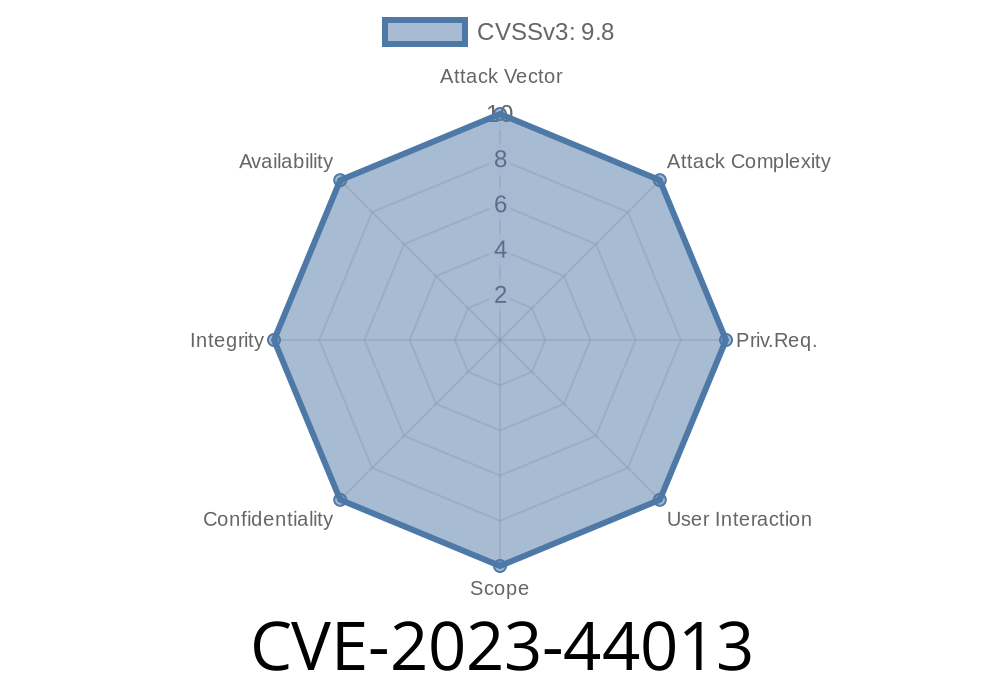In late 2023, cybersecurity researchers discovered a critical stack overflow vulnerability in the Tenda AC10U v1. (Firmware: US_AC10UV1.RTL_V15.03.06.49_multi_TDE01). If you’re using this popular home router, knowing the details is vital for keeping your network safe. This post breaks down the vulnerability, how it works, exploit details, and what you need to do right now.
What Is CVE-2023-44013?
CVE-2023-44013 is a stack buffer overflow discovered in the firmware of Tenda AC10U routers. The flaw is in the fromSetIpMacBind function, and it’s related to the way the router processes the list parameter. If an attacker sends a specially crafted request, they can cause a stack overflow, which could potentially allow for remote code execution.
Why does this matter?
A stack overflow can be exploited to crash the router, run malicious code, or even gain control over your network.
Where’s the Bug?
In the router’s web interface, the administrator can set up "IP-MAC Binding". The backend uses the function fromSetIpMacBind to process a parameter called list that contains IP-MAC pairs.
The firmware doesn’t properly check the length of the list parameter before copying it to a fixed-size stack buffer.
Example Vulnerable Code (Pseudocode)
void fromSetIpMacBind(char *list) {
char buffer[256]; // fixed-size local buffer
strcpy(buffer, list); // No length checking!
// ... further processing ...
}
Issue: If list is longer than 256 bytes, this overruns the memory, corrupting the stack.
Requirements
- Attacker must be able to reach the router’s web admin interface (commonly on LAN, sometimes WAN if misconfigured)
Exploit Example
An attacker can craft an HTTP POST request with an oversized list parameter. Here’s a simple curl example to demonstrate triggering the overflow.
Disclaimer: Use this only on devices you own for educational purposes. Unauthorized access is illegal.
curl -X POST \
http://<ROUTER_IP>/goform/fromSetIpMacBind \
-d "list=$(python3 -c 'print("A"*300)')"
This request would overflow the stack buffer with 300 'A' characters. In a real attack, this could be replaced with shellcode or return addresses to hijack execution flow.
Firmware: US_AC10UV1.RTL_V15.03.06.49_multi_TDE01
Check your firmware version in the admin panel (usually under “System Information”).
What To Do
1. Update Firmware: As of this writing, Tenda may not have released an official patch. Check regularly at Tenda’s firmware update page.
2. Limit Admin Access: Keep the admin web interface accessible only from your local network. Never expose it to the internet.
Strong Passwords: Set a strong admin password and disable remote management if not needed.
4. Network Segmentation: Place untrusted devices on a separate subnet from your router’s admin interface.
References & Further Reading
- Original CVE Detail
- Exploit Database
- Tenda AC10U Product Page
- Firmware Download (Chinese Tenda site)
Conclusion
CVE-2023-44013 is a severe vulnerability in Tenda AC10U routers, allowing for a stack overflow via the list parameter in the fromSetIpMacBind function. An attacker can trigger this flaw with a crafted HTTP request, potentially taking over your router or knocking it offline.
What now? If you own a Tenda AC10U with the vulnerable firmware, update ASAP when a fix comes out, and don’t expose your admin interface to the internet. Spread the word—secure your home network!
*Stay safe. Upgrade early. Share this post to help others secure their Tenda routers.*
*Exclusive content for educational purposes only.*
Timeline
Published on: 09/27/2023 15:19:34 UTC
Last modified on: 09/27/2023 18:45:57 UTC
